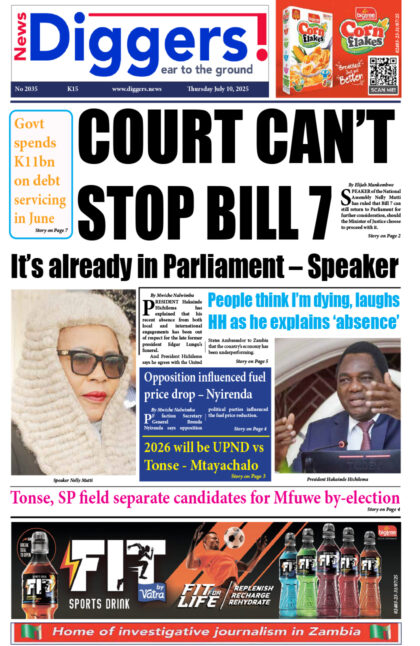GOVERNMENT has welcomed China’s willingness to implement the G20’s debt service suspension initiative in a methodical fashion on a case by case basis, as announced by that country’s Finance Minister Liu Kun.
And former Finance minister N’gandu Magande has described the development as good news, saying this will give the country space to use the money from donors and funders directly on projects instead of only focusing on paying off debt.
In a statement issued last week, Finance Minister Dr Situmbeko Musokotwane described China’s pronouncements as an important building block in Zambia’s case for debt restructuring.
“Zambia welcome’s Honourable Liu Kun’s (China’s Finance Minister) statement at the meeting of G20 finance ministers that China with the principle of collective action and fair burden sharing, is willing to implement the G20’s debt service suspension initiative in a methodical fashion on a case by case basis. We are also delighted with Mr YI Gang’s (Governor of the Peoples Bank of China) assurance (his statement was delivered at the IMFC) that China is now actively participating in the G20 common framework and supports a case-by-case approach to addressing debt under the framework,” the statement read.
“We note China’s request that “the IMF should call on all parties commercial creditors in particular, to restructure their debt in the principle of comparability of treatment. China’s pronouncements at the 2022 Spring Meetings of the IMF/World Bank are important building blocks in Zambia’s case for debt restructuring. Their message is very positive for us.”
In a separate statement, Friday, Dr Musokotwane welcomed China’s commitment to join the Official Creditors Committee for Zambia’s debt restructuring.
“The Honourable Minister of Finance and National Planning, Dr. Situmbeko Musokotwane, MP, has welcomed the People’s Republic of China’s commitment to join the Official Creditors Committee for Zambia’s debt restructuring. Mr. Yi Gang, Governor of the People’s Bank of China, confirmed that China will join Zambia’s other creditors on the committee with the view of resolving the country’s debt crisis. The confirmation was made yesterday at the Ministerial Meeting of the 45th Meeting of the International Monetary and Financial Committee (IMFC) in Washington DC. This follows on from the Government reaching an IMF Staff-Level Agreement in December 2021 that envisages the provision of US$1.4 billion in financing,” read the statement.
And in an interview, Magande described the development as progressive.
“I think that would be some good news then because it means that some of the debt that is outstanding will get less amount to pay on the loans to pay. So, that might give some space for the other people who want to help; the donors and the IMF to come in and help us with some money that we can use directly instead of using it to pay off the debt. If there is information now that the creditor who was still consulting has come along on the agreement then that is quite some progress,” said Magande.
“And we hope that very soon then we can be getting this arrangement and we will know how much is going to be rolled over to be paid back in a longer-term instead of in the short term when we need money for projects and so on.”
Meanwhile, economist Trevor Hambayi described the development as one of the last hurdles government needed to get past to get the creditors committee to come together.
“Obviously it is a positive development but I would have thought that China was going to join the creditors’ committee irrespective because you might appreciate that at the end of 2020, they had already agreed to join the G20 debt suspension initiative that was initiated by the G20. I would not think they were going to have to change their position as it stands now. The question obviously was China was going to be associated with this and I think that was what was making this a matter of concern because we would have required China to be able to come on the table for the IMF bailout to be able to be approved by the IMF board,” he said.
“Our perspective as a country obviously this is the direction that we have been trying to push to get the IMF bailout so that we can leverage our debt restructuring. This is a very positive thing in terms of achieving the goal because we have been working towards this for the last couple of months to try and achieve this. So this is one of the last hurdles that they needed to get past to get the creditors committee to come together. Once they have agreed on this, then they can go with a consolidated approach to the IMF for the bailout package.”
Hambayi said the country could utilise the IMF bailout package to pay off the debt service.
“I think it is important that we recognise the fact that, as the country, we do not need to wait for the IMF package to come to us to be able to implement our economic recovery strategy. Remember what we are trying to do with the debt restructuring is to reduce our debt service liability to what is affordable. But we have not been paying our debt since November, 2020. Technically speaking, our debt has been restructured which should have been giving us fiscal space to have the resources that we need to implement in our economic recovery programme. So in essence, we had the opportunity to be able to start this since November, 2020,” said Hambayi.
“The debt restructuring will basically be allowing us to a debt service. We could use the IMF bailout to pay our debt service if we do a balance of payment which basically means the IMF agrees to [give] us the US$1.4 and we receive US$400 million every year and we use that to pay the debt service.”


















